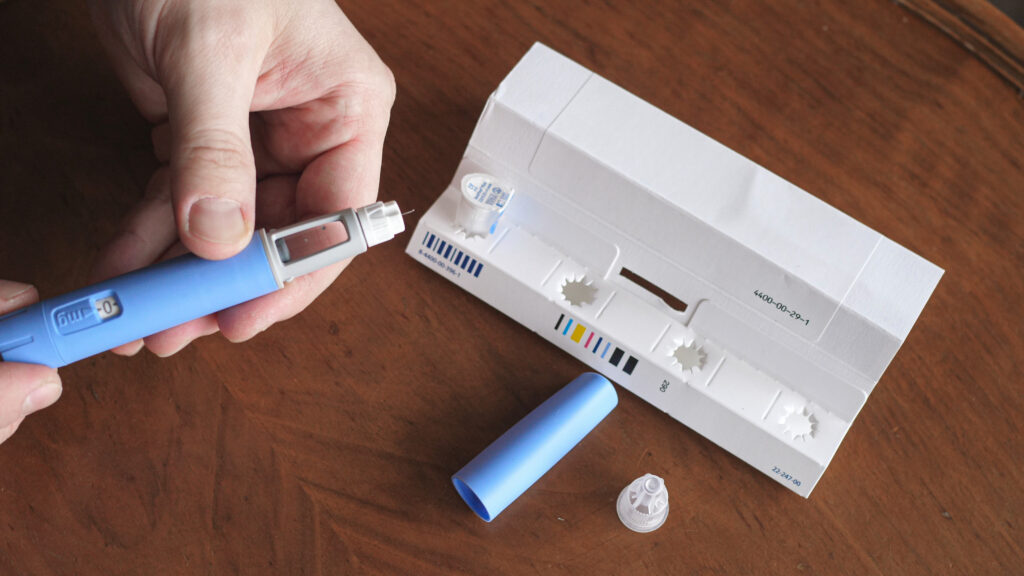The emergence of highly effective obesity drugs has spurred renewed efforts to get Medicare to pay for weight loss medications, but a group of health policy experts is sounding caution.
Even a small amount of uptake would create significant costs for Medicare, likely leading the federal insurer to raise premiums in the long run, the researchers said in a perspective piece Saturday in the New England Journal of Medicine.
The chronic medications may also have fewer benefits and more risks for older people — the population that Medicare serves, they wrote.
Novo Nordisk’s Wegovy is the newest obesity drug approved in the U.S., and several companies are racing to develop products as well. As the medications become more widespread, a bill for Medicare to expand coverage to obesity medications has been gaining momentum, with support from drugmakers, health groups, the NAACP, and lawmakers from both parties.
But, “there’s reason for caution, and there’s a lot of remaining unknowns,” said Khrysta Baig, the paper’s lead author and a health policy Ph.D. student at Vanderbilt University. “It’s really just prudent for Congress and CMS to weigh the tradeoffs and do more thorough analysis of the potential impacts of such large legislation.”
In the U.S., 42% of adults 60 and older are estimated to have obesity. If there’s 10% uptake in that group at Wegovy’s net annual price of about $13,600, that would cost $27 billion a year for Medicare, according to the paper. That amounts to 18% of the insurer’s spending on Part D (the prescription drug benefit) in 2019, the most recent year for which data was available.
The researchers then looked at a more conservative calculation. Medicare claims show that 21% of beneficiaries have a reported diagnosis of obesity. A 10% uptake in that group would still result in substantial costs — about $14 billion a year or 9% of Part D spending, the researchers said.
In a hypothetical scenario in which there’s 100% uptake among all older adults with obesity, the cost would exceed the total Part D budget and also eclipse the total excess health care spending associated with obesity, according to the researchers.
These numbers approach estimates that had been given for Biogen’s Alzheimer’s drug Aduhelm when it was first approved. If 10% of older adults with Alzheimer’s took Aduhelm at its original price, it would have cost Medicare about $34 billion, according to a STAT analysis.
In the case of the obesity drugs, the financial impact would stem from their fairly high price, the vast number of eligible people, and the need to use the drugs chronically, said Stacie Dusetzina, a co-author and a health policy professor at Vanderbilt University Medical Center. And unlike Aduhelm, whose efficacy has been debated, the obesity drugs face massive demand since they’ve been shown to have high efficacy in multiple trials.
“This study raises really important questions about the cost burden of these drugs,” said Juliette Cubanski, deputy director of the program on Medicare policy at KFF, a nonprofit that runs health policy analyses. The drugs could “pose real financial challenges for the Medicare program, and for beneficiaries in the form of premiums and taxpayers.”
The researchers’ concern echoes that of some other experts. The Institute for Clinical and Economic Review, a nonprofit organization that evaluates the cost-effectiveness of drugs, issued an alert last fall warning that the health system is at risk of running up against serious constraints with Wegovy.
ICER’s analysis shows that as soon as 0.1% of the eligible population takes Wegovy over five years, insurance companies and government payers may have to shift money or increase premiums.
The NEJM paper’s authors said there also needs to be a better evaluation of the benefits and risks of these drugs in older adults.
The hope with the drugs is that they help people prevent downstream complications from obesity, such as diabetes and heart disease. However, older people may have already experienced the complications that the medications are meant to help them avoid, said Baig, the lead author.
Older people may experience greater risks as well. The drugs have gastrointestinal side effects, such as nausea and diarrhea, that could affect older people more severely. Crucially, people lose not only fat mass, but also lean muscle mass on the drugs, and that could lead older people to become more frail, the researchers said.
John Batsis, a geriatrician who treats older adults with obesity and frailty at UNC-Chapel Hill, said the drugs are “promising,” but more data is needed on their effects in older adults. In clinical trials for Wegovy, 8.8% of people treated were between 65-75 years old and just 0.9% were 75 and older, according to the drug’s label.
Batsis said weight loss for older people with obesity can improve their cardiovascular health and physical function, but he is concerned about the loss of muscle mass and strength. People naturally lose muscle as they age, and if they’re losing weight on top of that without doing resistance exercises, there’s a risk they’re more vulnerable to stressors and have difficulty carrying out daily activities, he said.
Chris Gallagher, a policy consultant for the Obesity Action Coalition, a group that’s pushing for coverage, said it’s important for Medicare to pay for the drugs because private plans often follow the federal insurer. “Medicare is often seen as the gold standard for coverage. When Medicare says we’re not covering something, that gives health plans carte blanche to say we’re not going to do it either,” he said.
Moreover, many drugmakers are developing obesity medications and that could help lower prices over time, Gallagher said. “Prices will come down as new drugs enter the market and there’s more competition, and that will allow broader utilization of all obesity drugs for all people around the country.”
STAT’s coverage of chronic health issues is supported by a grant from Bloomberg Philanthropies. Our financial supporters are not involved in any decisions about our journalism.


